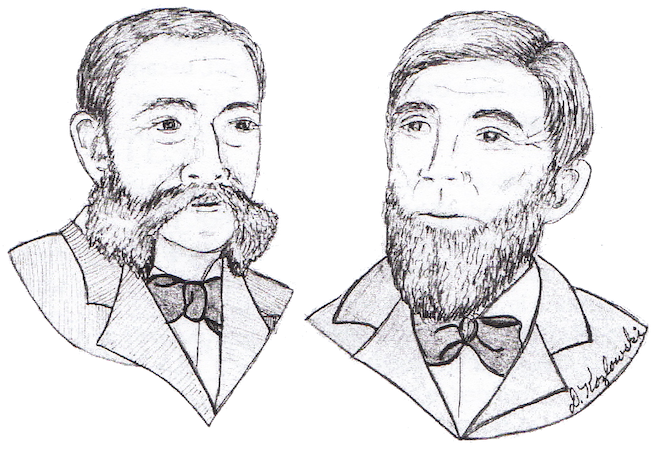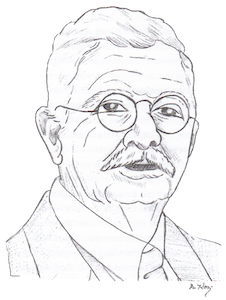Seed magnates led industry
One of the most important area business ventures in the 19th century was the growing of garden seeds. Milford and North Milford (Orange since1822) were a hotbed of novel seed development. Another 2014 Hall of Fame inductee, William Merwin, began his career in garden seeds before moving on to oysters. There were many others but the kings of local seed commerce were the Clark and Woodruff families. They each contributed to this industry both as rivals and partners, even within their own families.
Stiles Denison Woodruff, 1837-1906
Stiles D. Woodruff was a native of Orange born on November 27, 1837. He married Elizabeth M. Clark and raised four children. They were, Watson Stiles Woodruff (b. 4-8-1869); Frank C. Woodruff, who graduated Yale College '1888, before joining company with his father; Robert J., Yale 1896 and Yale law 1899, was well known lawyer; and Mary R., the only daughter, a graduate of Wellesley College. S.D. was a member of the Connecticut Legislature in 1880 meeting in the then new Capitol building. Stiles also served as Orange Town Clerk for twenty years and acted as clerk, treasurer and Deacon of the Orange Congregational Church. Preferring farming to other pursuits Father and sons held in excess of three hundred acres in Orange. Stiles Denison Woodruff passed away on April 10, 1906, at the age of sixty-seven years. His wife predeceased him, barely, on March 8, 1906, at the age 66.
Son Frank C. Woodruff Introduced, in 1890, the "Country Gentleman" a sweet corn variety that took Frank Woodruff fourteen years of selective breeding to develop. When it was released, it was immediately well received and persisted for many decades as one of the most popular white sweet corn varieties, for both home and market growers. The stalks average seven to eight feet tall. The ears reach about seven inches with irregular rows of white, sweet, shoe peg-shaped kernels. These Seeds are still available, and prized, today.
The company produced garden seed and became one of the largest dealers of garden seeds, selling both at wholesale and retail levels, in the east. Frank C. ran the New York office of the Company. They not only grew the standard varieties of garden vegetables, but have also done considerable experimenting and originated and introduced several varieties. These included 'Country Gentleman' sweet corn, 'Early Ford Hook' tomatoes and the 'Ensign Bagley' and 'Admiral Foote' potatoes.
Farmers being representative of the wealth of America in the 19th C, Son Watson, who too was to head the S.D. Woodruff & Sons Company in his turn, both farmed and pursued duties as President of the Orange Bank & Trust Co from the date of its organization, Director of the American Bank & Trust Co of Bridgeport, Clerk of the Orange Congregational Church and chairman of the draft board for Orange and Milford.
Another son, Robert became a prominent Attorney in Orange and New Haven.
The business of growing and selling seeds was carried on by Stiles D. Woodruff after his return from the Civil War. He bought the farm of Lyman Treat and immediately began to grow seeds for the wholesale trade. In 1890 he took his sons, Frank C. and Watson S. (b. 4-8-1869), into the business under the firm name of S. D. Woodruff & Sons. They opened an office in New York City under Frank C. Woodruff, while Watson S. Woodruff had charge of the home office. The brothers continued the business after S.D. died in 1906, until the death of Watson in 1930. Frank carried on alone until shortly before his death in 1944 when he sold the business to Hugh C. Laird and Eric Dahlberg. They continued doing business under the original name of S. D. Woodruff & Sons. The Chas. C. Hart Seed Company, founded in 1892 in Wethersfield , Connecticut , acquired the S.D. Woodruff & Son Company in 1958.
The Woodruff Seed Warehouse stood on Old Grassy Hill Road on the old New Haven-Derby Railroad line next to the large home built by Watson S. Woodruff. The warehouse was rebuilt into what was once the only apartment building in Orange
Everett Bryan Clark
The business of the growing garden and field seeds for the wholesale market was conducted for years in Derby by a Mr. Hodge. Hodge sold his interests to two brothers, Enoch and Bryan Clark of Orange.
Like S.D. Woodruff, Everett B. Clark fought in the Civil War with the Connecticut 27th Volunteers. Clark was captured and interred in the notorious Libby Prison in Richmond, VA. Like most of those captured early in the war, he was returned north in an exchange of prisoners and returned to private life. E.B. was a farmer who joined his uncles' Seed business shortly before the Civil war. In 1864, Everett B. Clark succeeded his father, Bryan Clark, as head of the business and enlarged the scope of the business. He grew seeds on his own farm but also engaged other farmers to grow seeds for him. While his farms were in Orange, his business headquarters was in Milford. As his sons grew older, he took them into the business with him.
By 1918 the Everett B. Clark Seed Company had 800 acres under cultivation in Orange and facilities in Michigan, Wisconsin, Montana, Idaho, and Colorado. E.B. Clark joined with competitors N.B Keeney & Sons and the John H. Allen Seed Co, to form the Associated Seed Growers Inc., Asgrow, in New Haven in 1927.
Frank H. Woodruff
Frank H. Woodruff was reputed to be another son of Stiles D. Woodruff, not likely as SD was twelve when Frank was born. In any event he went off on his own. F. H. Woodruff & Sons, Inc., was established in 1903 by Frank H. Woodruff, (b. in Orange, 1849 d. Milford 1927), and his two sons, William H. and Harold F. Woodruff. The business was begun in a barn on the home farm, with billing and bookkeeping done by lamplight at a desk in the dining-room of the farmhouse after the day's work. From this simple beginning the business grew rapidly until today the concern has branch warehouses in several States, with its main warehouse in Milford. Although the company specialized in vegetable seeds, by the 1930s it had developed notable lawn grasses and added flower bulbs to its list of products.
In 1957 Asgrow merged with F.H. Woodruff & Sons operating in Milford. The combined Asgrow then accounted for over Five Million acres of plantings in eighteen states. The merger announcement cited F.H. Woodruff & Sons as being 79 years old. Not hardly, since it was founded in 1903, but I could find no record of a Woodruff or Clark seed company founded in 1878 to match the boast. In 1968 Asgrow became a part of Upjohn Pharmaceuticals and, since 1996, became a branded subsidiary of Monsanto.
The F.H. Woodruff fields were along the Boston Post Road where I-95 and the Westfield Connecticut Post Mall now stand. Many of Milford's "old timers" worked the fields as teens, especially at harvest times. After a day picnicking at the nearby campground (in a glen, now destroyed, between Rte 1 and the current Barnes & Noble Building) others used the fields as a good place for pranks or to take their best girls to smooch.
For decades, representatives of E.B. Clark, S.D. Woodruff and F.H Woodruff could be expected to knock on farmers doors all across the great plains to sell the best seeds in the country. E.B. Clark produced hybrid sweet corn seeds for the western USA farmers. The production of a hybrid sweet corn proved valuable to the canning industry as it produced an evenly maturing crop and gave a larger yield per acre.
The headquarters facility stood well into the 20th Century on Railroad Avenue just west of High Street in downtown Milford. The Building still stands, having been converted to condominiums in the mid 1980s.
In the 1960's Asgrow built an office overlooking the Wilbur Cross Parkway in Orange. In 1971 this attractive building was sold to the Harvey Hubbell Company, maker of electrical equipment. They kept the (renamed) decorative plantings scheme seen from the parkway. Today the large campus is being readied for residential, park and educational purposes.
The Clark and Woodruff Seed families of Milford
It may look like watching grass grow, but Seed growing was a rough and tumble business. The four large area seed companies in 1927 (along with many others too) was required to provide samples for testing by State authorities to rank the ability of their seeds to germinate. This is a sample list (and summary results) of what the various Woodruff and Clark families had available 87 Years ago:
S.D. Woodruff & Sons, Orange:
Woodruff's Rival Parsnip, Davis White Kidney Wax Beans, Round Pod Kidney Beans, Fordhook Bush Lima Beans*, Early Wonder Beets (introduced in 1911), Columbia White Corn, Extra Early Dighton White Corn, Osage Muskmelon*, Scarlett Globe Radish*, Viroflay Spinach*,
F.H. Woodruff & Sons, Milford:
Stringless Refugee BeansDetroit Dark Red Beets, Woodruff's Early Wonder Beets*, Bagley Carrots, Wonderful Celery, Black Seeded Tennis Ball Lettuce*, Early May King Lettuce, Special Stock Lettuce, World Beater Pepper, Scarlett Globe Radish*, Round Thick Leaf Spinach*, Woodruff's Hot Weather Spinach*, Giant Summer Crookneck Squash*, Greater Baltimore Tomato
E.B. Clark Seed Co. Milford:
Black Valentine Beans*, Green Pod Long Beans, Detroit Dark Red Beets, Early Wonder Beets, Bagley Carrots*, Chatenay Carrots, Early Blanching Celery, Bloomsdale Savoy Spinach*, Giant Thick Leaf Spinach, King of Denmark Spinach*,
David L. Clark & Son:
Egyptian Beet*, Long Island Beauty Corn*, Malcom Sweet Corn, Whipple's Sweet Corn, Cromer's Special Sweet Corn*, Early Scarlet Radish,
*deemed by State testers (1927) to be "below standard" because of low germination rates. See graded on a curve or hundreds of samples. Below standard could still mean a 90% germination ate in a very competitive field though often "below standard" could mean as little as 40% germination; a real problem for a seed seller in a very competitive industry!



